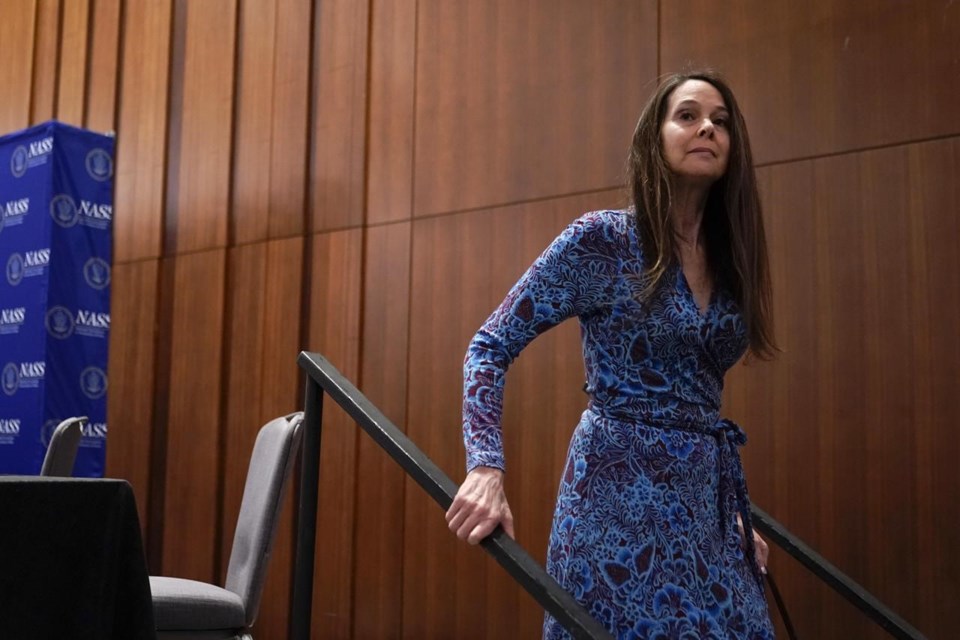WASHINGTON (AP) — Top state election and cybersecurity officials on Thursday warned about threats posed by Russia and other foreign adversaries ahead of the 2024 elections, noting that America's decentralized system of thousands of local voting jurisdictions creates a particular vulnerability.
Russia and Iran have meddled in previous elections, including attempts to tap into internet-connected . Distracted by war and protests, last year’s midterm elections, but security officials said they expect to be more active as the next presidential election season draws near. The first primaries are less than a year away.
Jen Easterly, director of the federal Cybersecurity and Infrastructure Security Agency, referenced Russia’s attack on Ukraine and the U.S.-led effort to supply weapons and other aid to the besieged country as a possible motivator. She said the agency was “very concerned about potential retaliation from Russia of our critical infrastructure.”
She also mentioned China as a possible source of election interference, especially as the relationship between the two countries has deteriorated, mostly recently over the that floated across the country before being shot down by a U.S. fighter jet.
“We’ve not seen anything here, but I’d like to end that with the word – yet,” said Easterly, speaking during the annual gathering of the National Association of Secretaries of State.
Of particular concern is the decentralized nature of America's election system. There are some 10,000 local voting jurisdictions throughout the U.S., including counties and townships, according to the National Conference of State Legislatures.
Not all of those have funding for new equipment, proper staffing or updated training of election workers. Easterly said it was a priority of her agency to get money and expertise to what she termed “target-rich, cyber-poor” entities.
Meagan Wolfe, administrator of the Wisconsin Elections Commission, said her state has about 1,850 local officials running elections, which makes it difficult to disburse federal money in a way that is effective over the long term. Wisconsin is a perennial swing state, where four of the past six presidential races have been decided by less than a percentage point and have found fertile ground since Wolfe spoke a day earlier during a separate news conference held by election and security officials.
“A lot of times if you don’t see anything bad happen in the cybersecurity space, it’s kind of forgotten about,” said Wolfe, who also is president of the National Association of State Election Directors. “People don’t remember that this is a real and imminent threat, and so getting those local jurisdictions, their governing bodies, to really buy into this concept and to support sustainable solutions for local election jurisdictions continues to be a real challenge, as well.”
Several secretaries of state called for additional federal funding for local election offices, which not only must prepare for cybersecurity threats but also have had to deal with since 2020.
Arizona Secretary of State Adrian Fontes noted that election workers and even voters in his state’s most populous county, Maricopa, have been and intimidation.
Stephen Spaulding, policy director for the U.S. Senate Committee on Rules & Administration, said the committee’s chairwoman, Democratic Sen. Amy Klobuchar, is trying to obtain more election funding after fizzled. Congress allocated $75 million in election security grants to states, but that was far short of what many state and local officials had requested.
“More than $75 million from last year’s omnibus is clearly needed in our view,” Spaulding said. “We have repeatedly heard about how sustainable funding ensures our elections continue to run smoothly, facilitate predictability and planning, and we’re striving to work on a bipartisan basis to get that done.”
___
This story was first published on February 16, 2023. It was updated on February 21, 2023 to make clear that Meagan Wolfe spoke a day earlier during a separate news conference held by election and security officials.
Associated Press coverage of voting receives support from the Jonathan Logan Family Foundation. The AP is solely responsible for all content.
Ayanna Alexander, The Associated Press



